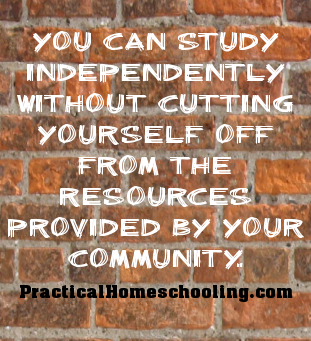Local Resources for Your Home Study Courses
By Joyce Swann
Printed in Practical Homeschooling #5, 1994.
 Joyce Swann thinks you can do college at home without long-distance calls to your professor.
Joyce Swann thinks you can do college at home without long-distance calls to your professor.

|
 |
 As the time approached for my oldest daughter to begin earning her bachelor's degree at home, I began to experience some uneasy moments. Occasionally I imagined the two of us seated at the dining table with an unintelligible maze of mathematical formulas spread out before us and nowhere to turn for help. At other times the imaginary "impossible assignment" was in history or literature or physics. In each case my fantasy involved the two of us frozen in time as we sat forever mystified by lesson requirements which were far beyond our capabilities.
As the time approached for my oldest daughter to begin earning her bachelor's degree at home, I began to experience some uneasy moments. Occasionally I imagined the two of us seated at the dining table with an unintelligible maze of mathematical formulas spread out before us and nowhere to turn for help. At other times the imaginary "impossible assignment" was in history or literature or physics. In each case my fantasy involved the two of us frozen in time as we sat forever mystified by lesson requirements which were far beyond our capabilities.
When Alexandra actually began working in a university home study program, I soon found that my concerns had, for the most part, been unfounded. These types of courses have been designed for a student to use without benefit of a hands-on instructor. Because they generally require a great deal more reading and writing than a comparable course taken on campus, and because the student does not have the benefit of the professor's lectures, the success of a university extension program depends largely on the student's ability to research and analyze material. Most assignments can be completed quite easily without outside assistance. Yet, even the best-planned home study degree program is bound to contain some material which will make it necessary for the student to seek occasional outside assistance.
When Alexandra was ready to graduate, we learned that many of the students made frequent long-distance telephone calls to the professors to discuss problems. While this is probably a fairly good option, it can also be expensive, and it is one which we never used. We wanted to find local resources which would be readily available and virtually cost-free.
The Public Library. The first resource we learned to use was the public library. When we learned that a simple telephone call to the local library can provide a wealth of free information, we were well on our way to overcoming the challenges of higher home education. We found that the library will furnish a caller with addresses and telephone numbers for government agencies as well as private corporations. They will provide the names of the corporate officers and elected and appointed officials to assist one in contacting various individuals for specific information. They will research quotes and provide the caller with their sources. They will order difficult-to-obtain materials which the caller may need to complete a research project. When Christopher was writing his Master's thesis on "Texas as a Republic," the El Paso Public Library had several very old manuscripts sent from the archives in San Antonio so that he could use them in his research. Of course, he was not allowed to take these manuscripts home, but it was much easier to work at the library in El Paso than to travel to San Antonio to obtain the information. The library also helped us, via telephone, to locate books on various subjects, and, when necessary, they had them sent to El Paso from other cities.
Tutors and Mentors. When we came to areas of study where the library could not assist us, we uncovered other sources. For instance, when Alexandra began working in her music appreciation course, we quickly realized that we were going to have to locate someone who could teach her to count meter as well as identify the structure of assigned pieces. Since I have no musical training, I suggested that we call a friend who has been a high school orchestra teacher for many years. A few evenings spent with him instructing her in the basics proved to be all that she needed. In fact, she was the one who subsequently taught the other children to count meter, etc.
University Professors. At one point when Victoria was working in her astronomy course, we found ourselves really stumped. Armed with the star maps which accompanied the course, we headed for the backyard and looked up at the nighttime sky expecting to easily identify the various constellations marked on the maps. We were dismayed to discover, however, that the constellations in the heavens do not have those convenient lines connecting them as they do on the maps! To the untrained eye all those little lights look, more or less, the same. After several fruitless evenings, I decided that she should call the University of Texas at El Paso and talk to one of the astronomy professors there. Fortunately, the professor she spoke with was very friendly and helpful and told her how to orient her map so that she could identify the various heavenly bodies. After that, completing the assignment posed no problems.
Clubs and Organizations. When Dominic was earning his master's degree, he took a course in historical sites which requires finding bona fide historical sites and writing about them under very specific guidelines. Because this type of course normally requires working closely with a professor, it is extended to students studying at home only by special permission. When Dominic received his permission to enroll in this area of study, he immediately began canvassing the El Paso area for suitable sites and in doing so found that help was readily available.
One of the sites Dominic was most interested in was a local cemetery listed in the National Register of Historical Sites. It contained graves dating back over 200 years. Some of the people buried there were well-known Westerners, such as John Wesley Hardin. When he called the El Paso Historical Society to see if they could help him locate information, Dominic talked to a society member who was delighted to share his considerable knowledge about the cemetery and offered to meet us there on Saturday to give us a personal tour. The following Saturday the gentleman gave Dominic a number of informative pamphlets along with a walking lecture that would have been a credit to any history professor. By the time the tour ended, Dominic had spent two and a half hours taking photographs and gathering the specific information he needed in order to write a paper that would earn him an A.
Any student earning a degree at home should realize early on that independent study does not mean cutting oneself off from the local community. Many artists, teachers, musicians, government employees, and ordinary citizens are willing to give you the assistance you need to master problem areas so that you can make the most of your degree through independent study.